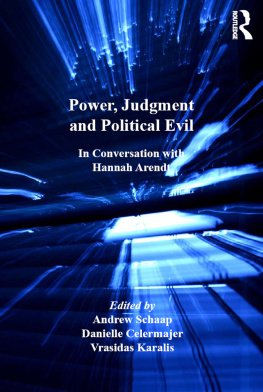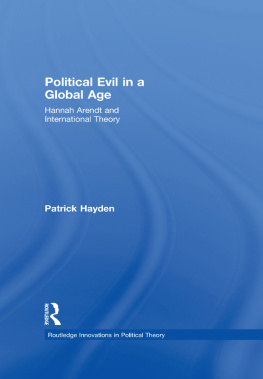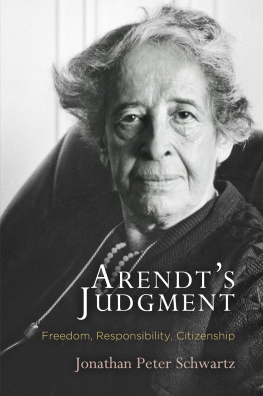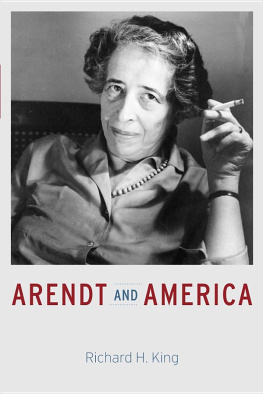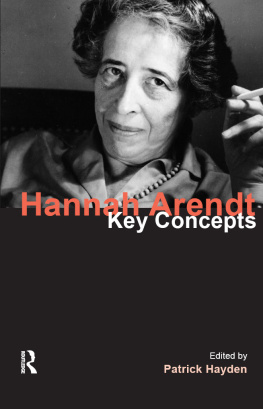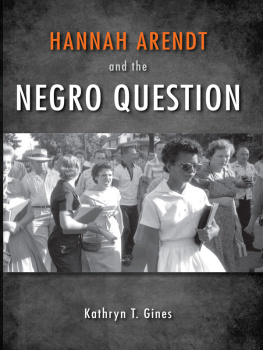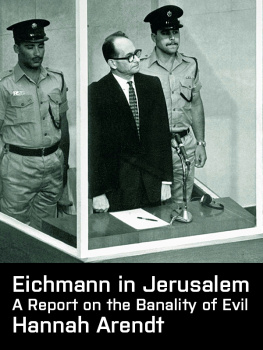Hannah Arendts Ethics
Also available from Bloomsbury
Heidegger, History and the Holocaust , Mahon O'Brien
The Aesthetico-Political , Martn Plot
Arendt: A Guide for the Perplexed , Karin A. Fry
For Jeanmarie, Shay and Shyam
Hannah Arendts Ethics
By Deirdre Lauren Mahony
University of Hamburg, Germany

Contents
I would like to thank Christopher Hamilton and Robert Weninger for their academic guidance and advice, and Sarah Schmidt for her support. My thanks also go to Frankie Mace at Bloomsbury for her enthusiasm for this project.
To my parents and my husband, I owe a deep debt of gratitude for their continued patience and encouragement.
CR | Hannah Arendt, Collective Responsibility, in Hannah Arendt, Responsibility and Judgment , ed. Jerome Kohn (New York: Schocken, 2003) |
EiJ | Hannah Arendt, Eichmann in Jerusalem: A Report on the Banality of Evil (New York: Penguin, 2006) |
EU | Hannah Arendt, Essays in Understanding , ed. Jerome Kohn (New York: Schocken, 1994) |
HC | Hannah Arendt, The Human Condition (Chicago: University of Chicago Press, 1998) |
LKPP | Hannah Arendt, Lectures on Kants Political Philosophy , ed. Ronald Beiner (Chicago: University of Chicago Press, 1982) |
LMT | Hannah Arendt, The Life of the Mind, Volume One: Thinking (New York: Harcourt, 1978) |
OR | Hannah Arendt, On Revolution (New York: Penguin, 2006) |
OT | Hannah Arendt, The Origins of Totalitarianism (New York: Harcourt, 1968) |
PR | Hannah Arendt, Personal Responsibility Under Dictatorship, in Hannah Arendt, Responsibility and Judgment , ed. Jerome Kohn (New York: Schocken, 2003) |
R&J | Hannah Arendt, Responsibility and Judgment , ed. Jerome Kohn (New York: Schocken, 2003) |
SQ | Arendt, Some Questions of Moral Philosophy, in Hannah Arendt, Responsibility and Judgment , ed. Jerome Kohn (New York: Schocken, 2003) |
TMC | Hannah Arendt, Thinking and Moral Considerations, Hannah Arendt, Responsibility and Judgment , ed. Jerome Kohn (New York: Schocken, 2003) |
Hannah Arendt, the JewishGerman (and later American) thinker, writer and teacher, has become a well-known figure in twentieth-century Western intellectual life, particularly in her adopted home of the United States. Arendt was an migr who fled the persecution in Europe. Finding refuge in America, she developed reflections on totalitarianism, Jewish identity, political theory and practice, culture, education and ethics that have informed numerous discourses in modern American and European philosophy, politics and history. Arendt has been variously considered a philosopher, a political scientist, a historian, a German romantic apologist for Heidegger, a disciple of Karl Jaspers, a Zionist and an enemy of the Jewish people. Her work has been both harshly criticized and reverently praised, her thinking considered original by some and derivative by others. Critics have emphasized her perceived conservatism as well as some of her more radical approaches, depending on their vantage point in the political spectrum. Her presence in the world, that is to say, her significance as a public thinker for public discourse and the contribution her thinking has made to the study of some of the most fundamental concepts in Western thought (totalitarianism, revolution, freedom and action in politics, for example) are considerable. Whether provoking fierce (and sometimes bitter) controversy or respectful veneration, even her detractors would admit that Hannah Arendt has had a significant impact on modern thought.
Recent years have seen renewed interest in Hannah Arendts work, from both within and outside the Academy. The year 2011 marked the fiftieth anniversary of the trial of Adolf Eichmann in Jerusalem, on which Arendt had famously (and controversially) reported. Consequently, the last few years have witnessed a revival of discussions of the trial, its outcome Eichmanns execution and the interpretation of Eichmann and his motivations that Arendt proposed in her reports. Significant new books have been published which once again seek to deny the historical accuracy of Arendts view of Eichmann, most notably That modern audiences, academic and non-academic, see echoes of the Europe of the 1930s in todays right-wing populism is certainly concerning. Even the insights and guidance of as eminent and respected a figure as Hannah Arendt provide small comfort.
Arendt is particularly renowned as a political theorist, a fact that is reflected in the landscape of literature on Arendt. The vast majority of studies on her thought are concerned with the political concepts she illuminates in works such as The Origins of Totalitarianism , The Human Condition and On Revolution . Exploration of Hannah Arendts ethical thought often seems to be relegated to second place in the literature, and, indeed, often discussed only insofar as it pertains to her political thinking. Although politics was undoubtedly a major concern in her work, ethics and morality, I would argue, occupy an equally central place in her canon, and her ethical theories in particular require deeper critical analysis.
The dominance of political-theory interpretations in Arendt studies and the comparative lack of (moral) philosophy approaches are attributable not only to Arendts inspiring reinvigoration of older political concepts in the modern world, but also to the fact that she thought of herself, primarily, as a political theorist, describing her profession if it can be called that as political theory
Arendt also held that there is a vital tension between philosophy and politics,philosophical standards on politics is an unnecessary and damaging move in Arendts view, which maligns the very essence of politics its plural and conditional nature. Arendts amor mundi ensured she could never consider the contingent and diverse world of politics beneath her dignity.
Though explicitly moral philosophical readings of Arendts thinking are limited, the many political-theory interpretations do encompass an ethical dimension, pertaining to the supposed lack of ethical constraint placed on the actors in Arendts ideal political realm. This area of study, which is about ethics within Arendtian politics rather than Arendtian ethics per se, has produced a rich debate among Arendt scholars, leading to her appropriation as a relevant thinker for a variety of different political positions.
Arendts valorization of the performance of political action, coupled with her view that the social (and thereby also moral questions of social justice) ought to be excluded from the realm of the political proper she criticizes the rise of the social
These concerns have, in turn, elicited responses from those who seek to recover a moral dimension to Arendtian politics. Deliberative democratic interpretations such as those of Seyla Benhabib and Jrgen Habermas In this way, deliberative democratic interpretations of Arendt recover a moral dimension in the practice of Arendtian politics if political action is communicative as well as performative, then it is imbued with moral respect for other actors, with reciprocity and with a desire to arrive at decisions in conjunction with, and not in opposition to, others and their views.


